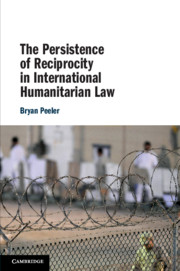19 results
Appendix 1 - List of Interviews
- from Appendices
-
- Book:
- The Persistence of Reciprocity in International Humanitarian Law
- Published online:
- 03 October 2019
- Print publication:
- 24 October 2019, pp 185-185
-
- Chapter
- Export citation
Appendix 3 - Summary of Key GWOT Detainees Memoranda
- from Appendices
-
- Book:
- The Persistence of Reciprocity in International Humanitarian Law
- Published online:
- 03 October 2019
- Print publication:
- 24 October 2019, pp 188-190
-
- Chapter
- Export citation
Contents
-
- Book:
- The Persistence of Reciprocity in International Humanitarian Law
- Published online:
- 03 October 2019
- Print publication:
- 24 October 2019, pp vii-ix
-
- Chapter
- Export citation
3 - Reciprocity and the Updating of the Geneva Conventions
-
- Book:
- The Persistence of Reciprocity in International Humanitarian Law
- Published online:
- 03 October 2019
- Print publication:
- 24 October 2019, pp 59-94
-
- Chapter
- Export citation
Dedication
-
- Book:
- The Persistence of Reciprocity in International Humanitarian Law
- Published online:
- 03 October 2019
- Print publication:
- 24 October 2019, pp v-vi
-
- Chapter
- Export citation
5 - The Expectation of Reciprocity and the GWOT
-
- Book:
- The Persistence of Reciprocity in International Humanitarian Law
- Published online:
- 03 October 2019
- Print publication:
- 24 October 2019, pp 128-168
-
- Chapter
- Export citation
Appendix 2 - Geneva Convention (III) Relative to the Treatment of Prisoners of War
- from Appendices
-
- Book:
- The Persistence of Reciprocity in International Humanitarian Law
- Published online:
- 03 October 2019
- Print publication:
- 24 October 2019, pp 186-187
-
- Chapter
- Export citation
4 - The Expectation of Reciprocity and the War in Vietnam
-
- Book:
- The Persistence of Reciprocity in International Humanitarian Law
- Published online:
- 03 October 2019
- Print publication:
- 24 October 2019, pp 95-127
-
- Chapter
- Export citation
6 - Conclusion
-
- Book:
- The Persistence of Reciprocity in International Humanitarian Law
- Published online:
- 03 October 2019
- Print publication:
- 24 October 2019, pp 169-184
-
- Chapter
- Export citation
1 - Introduction
-
- Book:
- The Persistence of Reciprocity in International Humanitarian Law
- Published online:
- 03 October 2019
- Print publication:
- 24 October 2019, pp 1-11
-
- Chapter
- Export citation
Bibliography
-
- Book:
- The Persistence of Reciprocity in International Humanitarian Law
- Published online:
- 03 October 2019
- Print publication:
- 24 October 2019, pp 191-207
-
- Chapter
- Export citation
Abbreviations
-
- Book:
- The Persistence of Reciprocity in International Humanitarian Law
- Published online:
- 03 October 2019
- Print publication:
- 24 October 2019, pp xiii-xiv
-
- Chapter
- Export citation
Copyright page
-
- Book:
- The Persistence of Reciprocity in International Humanitarian Law
- Published online:
- 03 October 2019
- Print publication:
- 24 October 2019, pp iv-iv
-
- Chapter
- Export citation
Acknowledgements
-
- Book:
- The Persistence of Reciprocity in International Humanitarian Law
- Published online:
- 03 October 2019
- Print publication:
- 24 October 2019, pp x-xi
-
- Chapter
- Export citation
Appendices
-
- Book:
- The Persistence of Reciprocity in International Humanitarian Law
- Published online:
- 03 October 2019
- Print publication:
- 24 October 2019, pp 185-190
-
- Chapter
- Export citation
Index
-
- Book:
- The Persistence of Reciprocity in International Humanitarian Law
- Published online:
- 03 October 2019
- Print publication:
- 24 October 2019, pp 208-212
-
- Chapter
- Export citation
Table of Cases
-
- Book:
- The Persistence of Reciprocity in International Humanitarian Law
- Published online:
- 03 October 2019
- Print publication:
- 24 October 2019, pp xii-xii
-
- Chapter
- Export citation
2 - Reciprocity and IHL Compliance
-
- Book:
- The Persistence of Reciprocity in International Humanitarian Law
- Published online:
- 03 October 2019
- Print publication:
- 24 October 2019, pp 12-58
-
- Chapter
- Export citation

The Persistence of Reciprocity in International Humanitarian Law
-
- Published online:
- 03 October 2019
- Print publication:
- 24 October 2019



